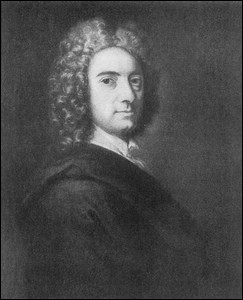More languages
More actions
Jucheguevara (talk | contribs) (redirected page, fixed intro text) Tags: New redirect Visual edit |
General-KJ (talk | contribs) (Added infobox and links) Tag: Visual edit |
||
| (3 intermediate revisions by 2 users not shown) | |||
| Line 1: | Line 1: | ||
{{Message box/Stub}}{{Infobox philosopher|name=George Berkeley|death_date=14 January 1753 (aged 67)|death_place=[[Oxford]], [[England]]|birth_date=12 March 1685|birth_place=Dysart Castle, near Thomastown, County Kilkenny, [[Ireland]]|image=George Berkeley.jpg|known=[[Subjective]] [[Idealism]]}} | |||
'''George Berkeley (1685-1753)''' was an [[Republic of Ireland|Irish]] [[Philosophy|philosopher]], bishop, and, for a while, unlucky missionary in America. His clerical activities (as [[Protestantism|Protestant]] minister in [[Catholicism|Catholic]] Ireland, annexed and colonized by force in the beginning of the 18th century), on behalf of the victorious English nation, were of a quite [[reactionary]] nature. Along with speculations of a spiritual order, he indulged as well in more material speculations (for example, regarding the utility of the famous workers’ houses and child-labor), as witnessed by his work, An Essay Towards Preventing the Ruin of Great Britain (1720), composed on the occasion of the collapse of the South Sea Company which had been a speculative adventure. [[Vladimir Lenin|Lenin]] described his philosophy in depth. A discussion of the same can be found in Part One, chapter 2 of the present book. His economic concepts (in The Querist), in particular those on money, were examined in depth by [[Karl Marx|Marx]] in his Contribution to the Critique of Political Economy. Works: An Essay Towards a New Theory of Vision (1707), A Treatise Concerning the Principle of Human Knowledge (1710), and Three Dialogues between Hylas and Philonous (1712), a popular exposé of the preceding work. | |||
[[Category:Philosophers]] | |||
[[Category:Idealist philosophers]] | |||
[[Category:People critiqued by Marx]] | |||
[[Category:People critiqued by Lenin]] | |||
Latest revision as of 17:43, 25 August 2024
 | This article is a stub. You can help improve this article by editing it. |
George Berkeley | |
|---|---|
 | |
| Born | 12 March 1685 Dysart Castle, near Thomastown, County Kilkenny, Ireland |
| Died | 14 January 1753 (aged 67) Oxford, England |
| Known for | Subjective Idealism |
George Berkeley (1685-1753) was an Irish philosopher, bishop, and, for a while, unlucky missionary in America. His clerical activities (as Protestant minister in Catholic Ireland, annexed and colonized by force in the beginning of the 18th century), on behalf of the victorious English nation, were of a quite reactionary nature. Along with speculations of a spiritual order, he indulged as well in more material speculations (for example, regarding the utility of the famous workers’ houses and child-labor), as witnessed by his work, An Essay Towards Preventing the Ruin of Great Britain (1720), composed on the occasion of the collapse of the South Sea Company which had been a speculative adventure. Lenin described his philosophy in depth. A discussion of the same can be found in Part One, chapter 2 of the present book. His economic concepts (in The Querist), in particular those on money, were examined in depth by Marx in his Contribution to the Critique of Political Economy. Works: An Essay Towards a New Theory of Vision (1707), A Treatise Concerning the Principle of Human Knowledge (1710), and Three Dialogues between Hylas and Philonous (1712), a popular exposé of the preceding work.
